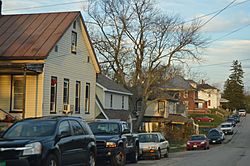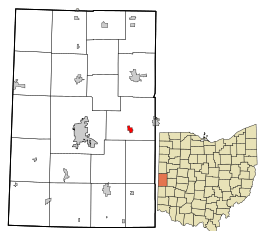Gettysburg, Ohio facts for kids
Quick facts for kids
Gettysburg, Ohio
|
|
|---|---|
|
Village
|
|

Houses on Main Street
|
|

Location in Darke County and the state of Ohio.
|
|
| Country | United States |
| State | Ohio |
| County | Darke |
| Township | Adams |
| Area | |
| • Total | 0.44 sq mi (1.14 km2) |
| • Land | 0.44 sq mi (1.13 km2) |
| • Water | 0.00 sq mi (0.00 km2) |
| Elevation | 1,007 ft (307 m) |
| Population
(2020)
|
|
| • Total | 463 |
| • Estimate
(2023)
|
461 |
| • Density | 1,057.08/sq mi (407.99/km2) |
| Time zone | UTC-5 (Eastern (EST)) |
| • Summer (DST) | UTC-4 (EDT) |
| ZIP code |
45328
|
| Area code(s) | 937, 326 |
| FIPS code | 39-29974 |
| GNIS feature ID | 2398957 |
Gettysburg is a small village located in Darke County, Ohio, in the United States. In 2020, about 463 people lived there. It's a quiet place with a fascinating past!
Contents
History of Gettysburg
How Gettysburg Started
Gettysburg was founded in the late 1820s by people who came from Adams County, Pennsylvania. When the village was officially mapped out by John Hershey in 1842, it was named after Gettysburg, which was the main town in Adams County. The first church in the community was built around 1847 or 1848, and the first school opened in 1850.
Busy Times in the Village
By the 1860s, Gettysburg was a busy place. It had many different shops and businesses. You could find general stores, shoe shops, and even places where people made furniture or wagons. There were also blacksmiths, tailors, doctors, and a hotel. The village also had grain elevators and mills for processing flour and wood.
The Railroad Era
Around 1863, a railroad line was built through Gettysburg. This line later became part of the Pennsylvania Railroad. A very special event happened on April 30, 1865. Abraham Lincoln's funeral train passed through the village on its way to his burial place in Springfield, Illinois.
The railroad helped Gettysburg become an important shipping point for farm products. For example, in 1907, a huge amount of tobacco and grain was shipped out by train. The railroad line was closed in the 1980s. Today, part of the old railway path is used as a walking and biking trail called the Tecumseh Trail Multi-use Pathway.
A World-Famous Invention
In 1922, a local businessman named Ira Petersime invented the electric poultry incubator. This machine helps hatch chicken eggs. Soon, Ira and his son, Ray, built a factory in Gettysburg. They started selling their incubators and other equipment all over the country and even to other parts of the world.
Their company grew to be one of the biggest makers of poultry incubators globally. In 1933, a local historian said that the Petersime Incubator Co. "put Gettysburg on the map of the world." The business finally closed in 2006.
Gettysburg's Geography
Gettysburg is a small village. According to the United States Census Bureau, it covers a total area of about 0.44 square miles (1.14 square kilometers). All of this area is land.
Population Information
| Historical population | |||
|---|---|---|---|
| Census | Pop. | %± | |
| 1870 | 228 | — | |
| 1880 | 292 | 28.1% | |
| 1890 | 274 | −6.2% | |
| 1900 | 246 | −10.2% | |
| 1910 | 320 | 30.1% | |
| 1920 | 375 | 17.2% | |
| 1930 | 418 | 11.5% | |
| 1940 | 440 | 5.3% | |
| 1950 | 451 | 2.5% | |
| 1960 | 443 | −1.8% | |
| 1970 | 526 | 18.7% | |
| 1980 | 545 | 3.6% | |
| 1990 | 539 | −1.1% | |
| 2000 | 558 | 3.5% | |
| 2010 | 513 | −8.1% | |
| 2020 | 463 | −9.7% | |
| 2023 (est.) | 461 | −10.1% | |
| U.S. Decennial Census | |||
The table above shows how the population of Gettysburg has changed over the years. In 2010, there were 513 people living in the village. The population density was about 1165.9 people per square mile.
See also
 In Spanish: Gettysburg (Ohio) para niños
In Spanish: Gettysburg (Ohio) para niños
 | Isaac Myers |
 | D. Hamilton Jackson |
 | A. Philip Randolph |

